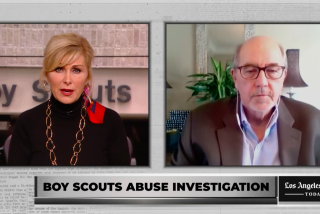Bitter Fallout, Sweet Rewards in the Newsroom
- Share via
Years ago, an editor whose opinion I respect told me that I could be sure I was doing something right if what I wrote managed to anger everybody involved in the story.
That, he said, meant that I was not taking sides and that the truth tended to hurt even the righteous.
Although my editor was exaggerating a bit, those loaded words have hung with me and, over time, have boiled down to the maxim that objectivity may be one of the most subjective elements of a news story.
Why go here instead of there? How long do you wait for someone to return your phone call? What’s the difference between conservative and right-wing? What is a political moderate?
These are mundane, rather nagging questions that tend to hover over most newsrooms. Reporters and editors may attempt to answer a few of them out loud, but most of the time, habit or even instinct takes over without so much as a because .
But that often changes once a story sees print. Letter writers want to know how you could have seen this when they saw that. Or callers say they liked the story but wonder why you didn’t quote so-and-so.
And sometimes, the consequences of what one writes in a newspaper are astounding.
Not long ago, I wrote a story about lesbians, about the subtle and not-so-subtle discrimination against homosexual women in these enlightened times.
At their request, many of the women I talked to were quoted anonymously, but one of those who did allow me to use her name and photograph later wished that she had not.
Shortly after the story appeared, a woman called her home and told her to “burn in hell.” And an intruder--police don’t know who--later slashed her furniture with a knife, smashed her dishes on the floor and spray-painted the inside walls of her condominium.
“I know that there was good that came from the article,” the woman says. “But what happened to me was pretty terrifying.”
Tom and Janice Colella, the subjects of another news story, are still flabbergasted with the attention they are receiving months after I wrote about their experience of unwittingly adopting a mentally disturbed boy.
For weeks after the story appeared, movie producers, agents and scriptwriters deluged me with phone calls. How could they get in touch with the Colellas? Would they sell the rights? Could we do lunch?
The likeness of the Colellas has yet to appear in a made-for-TV movie, but assuming the Hollywood writer’s strike ends one of these days, it may not be long before their story does undergo such a metamorphosis.
And for those of you who miss that, there may be another chance to see a real-life adoption tragedy, this one starring Morgan Fairchild.
Fairchild’s agent recently called me to say that the actress, who owns her own production company, is terribly eager to portray a San Bernardino mother I wrote about who unwittingly adopted a schizophrenic girl--with harrowing results.
Of course, the fallout from most newspaper stories, both good and bad, is far less dramatic.
But that does not make them any less important. One reaction I will not forget is that of Tim Hsia, a 12-year-old student from Taiwan whom I included in a story about Barbara DeBow, Orange County’s teacher of the year.
When DeBow pointed out to Tim that his name and a few of his thoughts had appeared in The Times, the boy gave one of his ear-to-ear smiles and leaped from his seat to jump for joy.


